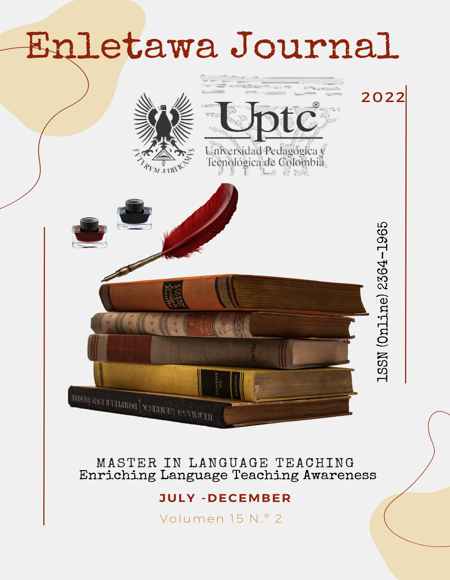Aportes del material impreso en la enseñanza del inglés como lengua extranjera durante el periodo de educación a distancia en el municipio de Saboyá

Resumen
Este proyecto se centra en un método de investigación cualitativo llamado estudio de caso intrínseco, en el cual se exploran y analizan las contribuciones del material impreso en la enseñanza del inglés como lengua extranjera en cuatro instituciones públicas y primarias del área urbana y rural de Saboyá, Boyacá. El proyecto surge debido al aprendizaje a distancia que se llevó a cabo entre junio y noviembre de 2020. Los instrumentos utilizados para obtener la información fueron una encuesta, una entrevista estructurada y el material impreso que los docentes diseñaron. Los resultados de este estudio reflejan los procesos de toma de decisiones que realizaron los profesores al momento de preparar sus clases, en los que incluyeron temas de otras asignaturas. Esta metodología es conocida como Aprendizaje Integrado de Contenido y Lenguaje (CLIL, por sus siglas en inglés). Además, el diseño del material impreso era adecuado para alcanzar los objetivos de la clase y ayudaba a los alumnos a mejorar su motricidad fina y su vocabulario en inglés
Palabras clave
materiales impresos, enseñanza del inglés como lengua extranjera, educación a distancia, aprendizaje a distancia y perspectivas de los profesores
Biografía del autor/a
Juan Manuel Guerrero Beltran
Active Bachelor’s student in Bilingualism. Universidad El Bosque
Yenny Paola Flórez Delgado
Active Bachelor’s student in Bilingualism. Universidad El Bosque
Maria Fernanda Pérez Jimenez
Active Bachelor’s student in Bilingualism. Universidad El Bosque
Nicole Marie Perez Pereira
Active Bachelor’s student in Bilingualism. Universidad El Bosque
Citas
- Boudreau, E. (2020, July 1). What Makes an Excellent Online Teacher? Harvard Graduate School of Education. https://www.gse.harvard.edu/news/uk/20/07/what-makes-excellent-online-teacher
- Chen-Loyola. (2013). Print Materials for Effective Instruction. https://chenloyola.wordpress.com/eds-151-instructional-media-resources/print-materials-for-effective-instruction/
- Crowe, S., Cresswell, K., Robertson, A. et al. (2011). The Case Study Approach. BMC Medical Research Methodology, 11(100). https://bmcmedresmethodol.biomedcentral.com/articles/10.1186/1471-2288-11-100 DOI: https://doi.org/10.1186/1471-2288-11-100
- Darwish, S. (2014). Teachers’ Perceptions on Authentic Materials in Language Teaching in Kuwait. Journal of Education and Practice, 5(18). https://core.ac.uk/download/pdf/234635906.pdf
- Florida Center for Instructional Technology. (2009). A Teacher's Guide to Distance Learning. Chapter 6. print technologies. FCIT. https://fcit.usf.edu/distance/chap6.htm
- Formplus blog (2020). Structured Interviews: Definition, Types + [Question Examples]. Formpl. https://www.formpl.us/blog/structured-interview
- History Philippine Normal University -HPNU-. (2015, July 28). Printed Materials. Educational Technology. Non-Projected Media. https://edtechnonprojectedmedia.wordpress.com/2015/07/16/printed-materials/
- International TEFL and TESOL training (iTTT). (2011). TEFL/TESOL Guide to Teaching English Abroad. TEFL Course. https://www.teflcourse.net/pdf/guide.pdf
- Lawrence, J. (2016). Role of Instructional Materials in Academic Performance in Community Secondary Schools in Rombo District. University of Tanzania. https://core.ac.uk/download/pdf/83632862.pdf
- Logsdon, A. (2021). Fine Motor Skills for Toddlers and Preschoolers: What Are Fine Motor Skills? Very well family. https://www.verywellfamily.com/what-are-fine-motor-skills-2162037
- Macías, D. F. (2010). Considering New Perspectives in ELT in Colombia: From EFL to ELF. HOW Journal, 17(1), 181-194. https://howjournalcolombia.org/index.php/how/article/view/72
- McKay, L. S (2003). Teaching English as an International Language: Rethinking Goals and Perspectives. The Electronic Journal for English as a Second Language, 7(1). http://www.tesl-ej.org/wordpress/issues/volume7/ej25/ej25r5/
- Moore, S. (1997). The Role of the Teacher in Distance Education: The Teacher Perspective. Mount Royal College. https://files.eric.ed.gov/fulltext/ED407022.pdf
- Owiti, T., Barasa, P., & Omulando, C. (2019, February). Teachers’ Conceptualization of Authentic Printed Materials in the Teaching of Intensive Reading in Secondary Schools in Bondo Sub-County, Kenya. Journal of Education and Research, 7(2). https://www.researchgate.net/publication/346400616_Teachers'_Conceptualization_of_Authentic_Printed_Materials_in_the_Teaching_of_Intensive_Reading_in_Secondary_Schools_in_Bondo_Sub-County_Kenya
- Pol, F. (2017). An Analysis of Synchronous and Asynchronous Communication Tools in e-Learning. Advanced Science and Technology Letters, 143, 230-234. https://www.researchgate.net/publication/313673458_An_Analysis_of_Synchronous_and_Asynchronous_Communication_Tools_in_e-Learning
- Rodríguez, M. (2011, August). CLILL: Colombia Leading into Content Language Learning. Íkala Revista de Lenguaje y Cultura 16(28). http://www.scielo.org.co/scielo.php?script=sci_arttext&pid=S0123-34322011000200004 DOI: https://doi.org/10.17533/udea.ikala.9912
- Simonson, M., Zvacek, S., & Smaldino, S. (2019). Teaching and Learning at a Distance: Foundations of Distance Education (7th ed.) Information Age Publishing. https://books.google.com.co/books?hl=en&lr=&id=qh-3DwAAQBAJ&oi=fnd&pg=PR1&dq=distance+teaching+in+elementary&ots=EdxkFY6hEK&sig=MRzrShiFfxWIOsL1WrdR7Ls6_g#v=onepage&q=distance%20teaching%20in%20elementary&f=false
- Story, D. A., & Tait, A. R. (2019). Survey Research. Anesthesiology, 130(2), 192-202. https://doi.org/10.1097/ALN.0000000000002436 DOI: https://doi.org/10.1097/ALN.0000000000002436
- Usma, J. (2009). Education and Language Policy in Colombia: Exploring Processes of Inclusion, Exclusion, and Stratification in Times of Global Reform. Profile, 11, 123-141. https://www.researchgate.net/publication/237645132_Education_and_Language_Policy_in_Colombia_Exploring_Processes_of_Inclusion_Exclusion_and_Stratification_in_Times_of_Global_Reform_Politicas_educativas_y_linguisticas_en_Colombia_procesos_de_inclusion_
- Vélez-Rendón, G. (May 1, 2003). English in Colombia: A Sociolinguistic Profile. World Englishes, 22(2),185-198. https://doi.org/10.1111/1467-971X.00287 DOI: https://doi.org/10.1111/1467-971X.00287
- Wiseman, J. (July 23, 2018). What Is Content and Language Integrated Learning? Resources for English Language Learners and Teachers. Pearson English. https://www.english.com/blog/content-and-language-integrated-learning/#:%7E:text=Content%20and%20Language%20Integrated%20Learning%20(CLIL)%20is%20an%20approach%20where,relevant%20vocabulary%20and%20language%20skills.
- Yu, X. (2020). English Vocabulary Teaching Techniques at Junior Middle Schools. English Language Teaching, 13(11). https://doi.org/10.5539/elt.v13n11p12 DOI: https://doi.org/10.5539/elt.v13n11p12
